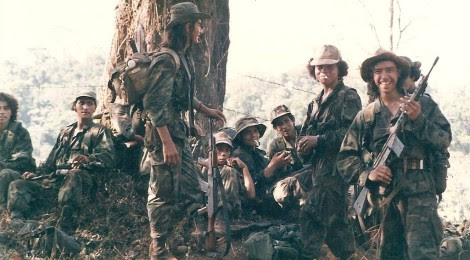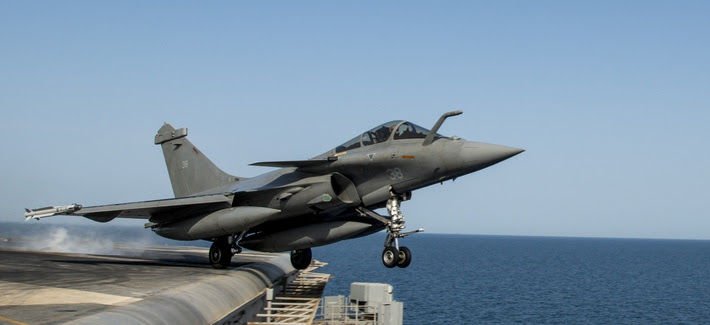23 Countries Want India's Help in Yemen Evacuation Operations
Perhaps we should be number 24 since we seem unable to evacuate our own citizens.
Excerpt:
India’s response to the crisis in Yemen has been both competent and convincing when it comes to both the safety of its own citizens and collaborating with third parties. As I’ve written before, New Delhi is eager to build a reputation for itself as a reliable “first responder” in the Indian Ocean Region (IOR). Recently, before the current crisis in Yemen, India demonstrated this with its swift naval deployment to the Maldives after a water shortage crisis. By answering calls for assistance from nearly two dozen states in Yemen, India can prove that it’s up to the task.
A comment we have not heard made about US crisis response in some time.
India’s success in evacuating its citizens from Yemen hasn’t gone unnoticed.
U.S. agrees to refuel Saudi planes, but isn't evacuating Americans from Yemen
Perhaps we will need that new fusion cell to deal with US hostages when they are taken in Yemen by either AQAP or the Houthis.
BY JAMES ROSEN
McClatchy Washington BureauApril 6, 2015 Updated 6 minutes ago
Defector sends thousands of 'The Interview' DVDs to North Korea
by Paula Hancocks, CNN
Updated 5:30 AM ET, Tue April 7, 2015
http://www.cnn.com/2015/04/07/Iran nuclear deal good example for N. Korea: Christopher Hill
With all due respect to Ambassador Hill I think he misses the point here. India has nuclear weapons and is not giving them up. That is why north Korea wants to be like India and not be like Iraq, Libya, Burma and anyone else who has given up either its actual or the pursuit of a deterrent capability. I seriously doubt that this framework or even an actual agreement if one is ever reached with Iran will influence the Kim Family Regime to follow suit. The only agreement the north will make will be one that recognizes the north as a nuclear power and focuses on limitation or reduction but not elimination. And we should keep in mind that sanctions against north Korea do not have the same effects as sanctions on Iran.
Hill said he is optimistic about the Iranian nuclear deal, and that the agreement is a good example for North Korea as it demonstrates "sincerity" on the part of the "P5," the five permanent members of the U.N. Security Council that took part in the negotiations, together with Germany."If I were a serious North Korean, I would be looking at that and saying, 'Why can't we do something like this?'" Hill said during the book discussions at the Johns Hopkins University's School of Advanced International Studies (SAIS)."I say that because they (North Korea) used to tell me, 'Why can't we be India?'" said Hill, who is now dean at the University of Denver's Josef Korbel School of International Studies. "This (Iranian deal) would be a real example from the Iran talks to make the North Koreans think."
But I think Ambassador Hill is on the right track here although I just do not buy the unspoken assumption that some day Kim Family Regime will want to "join the world." To do so may very well mean the end of the Regime.
Hill said, however, that he has not seen a sign from the regime of North Korean leader Kim Jong-un that it is "interested anymore in getting rid of their nuclear weapons.""I'm not sure they understand that they have to give up their nuclear weapons. I think the basic problem, unlike Iran, unlike many people in Iran, not other people in Iran but many people in Iran, I don't think North Korea has collectively decided they want to join the world," he said.
2015/04/07 04:31
By Chang Jae-soon
TATS AND TECHIES: BUILDING THE NEXT U.S. MILITARY
Excerpt:
Taken together, the Carter and Odierno announcements suggest that U.S. military leaders are reassessing existing policies. They both point toward a new talent management approach – acknowledging the changing goals, interests, and preferences of today’s individual service members from a new generation while simultaneously ensuring that the needs of military services are fully met. If carried out, this new direction will inevitably cause major changes to long-held cultures and traditions.
I do not think talent management can occur without significant personnel reforms of DOPMA and Goldwater Nichols and the industrial age personnel philosophies of readiness )(faces to spaces) and emphasis on personnel management by template (career paths to ensure all meet the nearly identical requirements for promotion to the next rank)
But the reality is that the U.S. military is and will likely largely remain a fundamentally hierarchical, bureaucratic, and conservative organization. There are some very good reasons for that; the U.S. military does not, and should not, become like Zappos and remove its entire hierarchy while driving out employees who crave structure. The U.S. military is unlikely to embrace sweeping change for the best of reasons: The chaotic nature of wars requires substantial individual and organizational discipline to fight and win them. For sizable parts of the force, that may be appropriate – for now.But warfare itself is changing. The next major war involving U.S. military forces may well demand more skills related to executing cyber attacks on an adversary’s networks than to launching large-scale infantry assaults. The shifting nature of emerging future warfare will inevitably encompass and combine all manner of new technologies, threats, and organizational responses. Taking on those challenges with a military that still manages its people largely like the force that entered Iraq in 2003 or even Kuwait in 1991 seems profoundly shortsighted. The changing face of 21st century warfarerequires new approaches and bold experimentation.
Conclusion:
The seeds of winning the next war may be found in the speeches that Carter and Odierno gave last week. They are quietly sounding the call for change. There is an entire generation of young American men and women ready to answer that call, and tens of thousands already in uniform who will be heartened by Carter and Odierno’s distinct (and perhaps grudging) recognition that their generation is truly different. To win the fights of the 21stcentury, the nation’s military must inspire and motivate this generation both to serve, and to stay. To do so, it must be ready to experiment with new ideas, challenge long-held norms, and be prepared to divest those things not absolutely essential.Maintaining a military filled with people capable of out-thinking and out-fighting U.S. adversaries in the next decade may depend on many of these fresh ideas catching fire and spreading throughout the force.
THE AMERICAN WORLD ORDER AND CHINA’S NEW BANK
Excerpts:
Even if China’s motives in launching the AIIB are purely self-interested, the bank responds to a pressing need. According to an August 2014 policy noteby the G-20, “the OECD estimates that $70 trillion in additional infrastructure capacity will be needed globally” by 2030. A January 2013 report by the World Economic Forum forecasts that $5 trillion of such investment will be required through then (translating to $75 trillion over the next 15 years). While the need for infrastructure may be greatest in Asia, it is universal; as such, the decision by some close U.S. allies to apply for membership in the AIIB is less about begrudging acquiescence to China’s strategic preferences than about a sensible assessment of the gains to be had by participating in the economic initiatives of a country that continues to grow by over 7 percent annually and is poised to have the world’s largest economy....By declaring it would not apply for membership in the AIIB, the United States reinforced the impression that it is resistant to China’s further integration into the institutions of global economic governance — an impression that is especially regrettable considering that the United States has done more than any other country to facilitate that very incorporation....The United States can continue to play a central role — even the central role — in the evolution of world order, but not if it attempts to stall or reverse deeply rooted system-level trends: The rise of China is one, as is, more broadly, the movement of the world’s center of economic gravity to the Asia-Pacific. While one may dispute Larry Summer’s proposition that “the United States lost its role as the underwriter of the global economic system” last month, it is difficult to disagree that the Bank’s success “should lead to a comprehensive review of the U.S. approach to global economics.” Such a review would likely conclude that including China in its economic initiatives and participating in China’s gives the United States more leverage to shape the Asia-Pacific’s economic order—and economic order writ large—than, respectively, excluding China and shunning its efforts.
AMERICA DID HYBRID WARFARE TOO
Good conclusion:
That the United States and NATO, a conventional defensive alliance, should be confounded by similar maneuvers on the part of Russia and left groping to “connect the dots” from Crimea to the Baltic is not a surprise. What should not be a matter for confusion is that hybrid warfare is not the exclusive province of a nefarious Putin, but rather a method available to any power with the motivation to employ it. This takes us only half way toward a solution. But, in paraphrase of Clausewitz, the first essential act of judgment is to establish the kind of war in which we are embroiled.

April 7, 2015 · in Commentary
The 5,548 ISIS Targets Struck By Coalition Air Forces, in 3 Charts

AA FONT SIZE + PRINT U.S. NAVY PHOTO BY MASS COMMUNICATION SPECIALIST 2ND CLASS JOHN PHILIP WAGNER, JR.
A French navy Rafale Marine aircraft launches from the U.S. Navy aircraft carrier USS Carl Vinson, on March 3, 2015.
http://www.defenseone.com/
APRIL 6, 2015BY KEDAR PAVGI
The Pentagon’s latest data release finally includes airplanes that were destroyed in fall 2014.



No comments:
Post a Comment